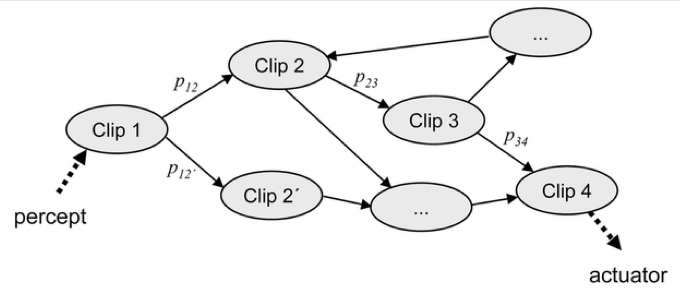Hans Briegel’s is professor of theoretical physics at
Innsbruck. His research is focused on fundamental aspects of quantum theory, its applications in computer science, and in other branches of science. One of his main current interests is to understand the ultimate power of machines to compute and to simulate Nature.
Briegel explores models for quantum information processing, both in physical and in biological systems. Research themes of his group “Quantum information and computation” are to investigate fundamental notions of quantum mechanics, such as
measurement,
entanglement, and
decoherence, their experimental signatures and their implications for our understanding of complex many-body systems.
Briegel has a model of creative freedom that he calls "projective simulation." Built on the notion of episodic memory, Briegel calls individual episodes in memory as "clips" that can be assembled randomly into "patchwork-like" sequences of virtual experience.
This opens the possibility of free behavior in embodied systems that are, Briegel says, "with no exception and at all scales of their body, subject to physical law." Briegel's understanding of "universal physical law" sounds
determinist. He asks, "Do we have to assume that the laws of physics are
incomplete and that there are new kinds of laws waiting to be discovered – maybe on the level of more complex biological entities – that will ultimately free us from the strict rule of physics?"
"Incomplete" was
Einstein's term for a "statistical" and
indeterministictheory. So we can ask for the source of randomness in Briegel's projective simulation model.
Perhaps Briegel is a
compatibilist? He says, "If we accept that free will is compatible with physical law, we also have to accept that it must be possible, in principle, to build a machine that would exhibit similar forms of freedom as the one we usually ascribe to humans and certain animals."
The machine he has in mind is a computer programmed with
artificial intelligence. "Computers are beginning to change the perception of ourselves from “human subjects” to “information processing systems,” he notes. Of course biology has consisted of “information processing systems,” creating order out of order, and even pure information out of order, for nearly four billion years.
Briegel then cites the
standard argument against free will: if determined, not free, if random, not freedom either.
Even if we are willing to accept that artificial agents, and computers in general, may exhibit some form of intelligence (which is usually defined as the capability of the agent to perceive and act on its environment in a way that maximizes its chances of success, we would hardly ascribe free will to them. In return, we would not like ourselves to be identified with such an agent. What is the reason for this disapproval? The main reason seems to be that the agent has a program which determines, for a given input (or sequence of inputs), its next step of action. Its action is the result of an algorithm: it is predictable and can e.g. be computed by some other machine.
The situation does not change fundamentally if the algorithm or program itself is not deterministic, as it is sometimes considered in computer science, invoking the notion of probabilistic Turing machines. Even if randomized programs can sometimes increase the efficiency of certain computations, it is not clear what one should gain from such randomization in the present context. If, before, the agent was the slave of a deterministic program, it is then the slave of a random program. But random action is not the same as freedom.
But Briegel goes on to try to find a location for indeterminism that could be beneficial to creativity. He says "We will show that [indeterminism can] have a positive effect on the agent...in the sense of introducing an element of creative variation in its memory-driven interactions with the environment. He models episodic memory as a network of "clips."

Triggered by perceptual input, the process of projected simulation starts a random walk through episodic memory, invoking patchwork-like sequences of virtual experience. Once a certain feature is detected, the random walk stops and is translated into motor action
The decribed process is the basic version of episodic memory, but it is not the only one. In a more refined version, which we called episodic and compositional memory, we consider not only transitions between existing clips, but clips may themselves be randomly created (and varied), as part of the simulation process itself. Random clip sequences that are generated this way may introduce entirely fictitious episodes that never happened in the agent's past.
The random walk in memory space, as described, constitutes part of what we call projective simulation. In another part, the agent's actions that come out of the simulation are evaluated. The result of this evaluation then feeds back into the details of the network structure of episodic memory, leading to an update of transition probabilities and of “emotion tags” associated with certain clip transitions.
Works
-
"Projective simulation for artificial intelligence," H.J. Briegel, G. De las Cuevas, Nature Scientific Reports 2, 400 (2012).
-
"On creative machines and the physical origins of freedom", H.J. Briegel, Nature Scientific Reports 2, 522 (2012).
-
"Quantum control and entanglement in a chemical compass", J. Cai, G.G. Guerreschi, H.J. Briegel, Physical Review Letters 104, 220502 (2010).
-
"Unifying all classical spin models in a Lattice Gauge Theory,"G. De las Cuevas, W. Dür, H.J.Briegel, M.A. Martin‐Delgado, Physical Review Letters 102, 230502 (2009).
-
"Measurement‐based quantum computation", H.J. Briegel, D.E. Browne, W. Dür, R.Raussendorf, M. Van den Nest, Nature Physics 5, 19 (2009).